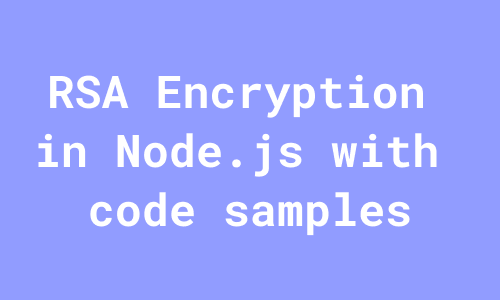
Node.js comes with a 'crypto' module that helps you create public and private key pairs to use public-key cryptography.
Public key cryptography explained:
This is a great article I came across that explains it well: RSA Encryption, Decryption and Signing in Node.js (Javascript) - With Examples *This post will explain the RSA algorithm, and how we can implement RSA Encryption, Decryption and Signing in Node.js…*www.sohamkamani.com
(Please do read this article since I don't cover this in the post)
Where it fell apart for me was actually implementation, since the keys created were in-memory and ephemeral. I'm writing this with code samples that you can run to:
-
Create a public/private key pair
-
Export it, and write it to your file system (as public.pem & private.pem files)
-
Create some sample data to encrypt (this is our secret we don't want anyone else knowing)
-
Encrypting said data, saving it in a file so we can see what it looks like
-
Decrypting this encrypted data to get our original secret data
Here's the Github repository:
You don't need to npm i as there are no dependencies, and the crypto module comes with node.
-
To create some data to encrypt, run this command
npm run create-data
You should now have a file called data_to_encrypt.txt in the project root. This is some arbitrary data created using Node.js's crypto module. If you're interested, have a look here: https://github.com/nkhil/node-crypto/blob/master/src/rsa/create-data-to-encrypt.js
OK, so now we have some secret data to encrypt 🎉
In order to encrypt it, we need to first create our Public-Private key pair. In the real world, we would give our public key publicly, and anyone would be able to use the public key to encrypt data, send it to us, and only we would be able to read that data (using our private key that only we will have).
Sidenote: This is a great little comic that explains public-private keys: How HTTPS works *In this scenario, there is only one key to encrypt and decrypt a message. Before sending a message to BrowserBird, I…*howhttps.works
Creating our public-private key pair
Here's how we will create our public-private key pair, export it and write it to file.
const crypto = require("crypto");
const fs = require("fs");
const { publicKey, privateKey } = crypto.generateKeyPairSync("rsa", {
// The standard secure default length for RSA keys is 2048 bits
modulusLength: 2048,
});
// *********************************************************************
//
// To export the public key and write it to file:
const exportedPublicKeyBuffer = publicKey.export({
type: "pkcs1",
format: "pem",
});
fs.writeFileSync("public.pem", exportedPublicKeyBuffer, { encoding: "utf-8" });
// *********************************************************************
// *********************************************************************
//
// To export the private key and write it to file
const exportedPrivateKeyBuffer = privateKey.export({
type: "pkcs1",
format: "pem",
});
fs.writeFileSync("private.pem", exportedPrivateKeyBuffer, {
encoding: "utf-8",
});
// *********************************************************************
2. To create the public / private key pair, you can run:
npm run create-keys
Note that we write it to the project root, and are named private.pem and public.pem.
Encrypting some data
Here's how we will be encrypting the data in the file called data_to_encrypt.txt that we created in step 1 (I've only numbered the commands you will be using)
const fs = require("fs");
const crypto = require("crypto");
const dataToEncrypt = fs.readFileSync("data_to_encrypt.txt", {
encoding: "utf-8",
});
const publicKey = Buffer.from(
fs.readFileSync("public.pem", { encoding: "utf-8" })
);
const encryptedData = crypto.publicEncrypt(
{
key: publicKey,
padding: crypto.constants.RSA_PKCS1_OAEP_PADDING,
oaepHash: "sha256",
},
// We convert the data string to a buffer using `Buffer.from`
Buffer.from(dataToEncrypt)
);
fs.writeFileSync("encrypted_data.txt", encryptedData.toString("base64"), {
encoding: "utf-8",
});
3. To encrypt the data in data_to_encrypt.txt (that we created in step 1 above), use
npm run encrypt-data
Once you run this ^, you should have a file named encrypted_data.txt in your project root. Feel free to open this file, this is the garbled version of our data.
Decrypt the data
Here's the code to decrypt the data
const crypto = require("crypto");
const fs = require("fs");
const encryptedData = fs.readFileSync("encrypted_data.txt", {
encoding: "utf-8",
});
const privateKey = fs.readFileSync("private.pem", { encoding: "utf-8" });
const decryptedData = crypto.privateDecrypt(
{
key: privateKey,
// In order to decrypt the data, we need to specify the
// same hashing function and padding scheme that we used to
// encrypt the data in the previous step
padding: crypto.constants.RSA_PKCS1_OAEP_PADDING,
oaepHash: "sha256",
},
Buffer.from(encryptedData, "base64")
);
fs.writeFileSync("decrypted_data.txt", decryptedData.toString("utf-8"), {
encoding: "utf-8",
});
Your decrypted data should be the same as the contents of the file data_to_encrypt.txt .
Congratulations, you've just used RSA encryption to encrypt some data using the public key, and then use the accompanying private key to decrypt and read that information.
Some notes
Note that in the real world, you will probably not have the keys as files, but as secure environment variables that are only available within your application. I've used files as a way to be able to understand RSA encryption better.
You need to ensure that your private keys are kept safe since anyone with access to your private keys can read all the encrypted information.
I've seen private keys kept securely using a storage solution like AWS S3 buckets (or GCP storage buckets), and making it so only applications with the appropriate IAM role can access files within the bucket. This resource creation is usually managed by Terraform but we won't go into that.
It should be noted that there is a limit to the size of the data you can encrypt using RSA encryption. When I try to encrypt a 128byte string, I get the following error:
Error: error:0409A06E:rsa routines:RSA_padding_add_PKCS1_OAEP_mgf1:data too large for key size
Have a look at this Stack Overflow discussion for more information.
Comments
Loading comments…